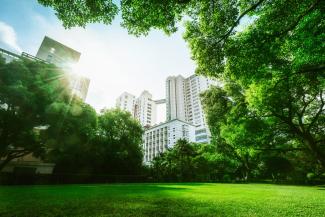
Singapore, 20 March 2023 (Monday) – The availability of neighbourhood amenities, including parks, greenspaces, or exercise spaces within a 10-minute walk from home, is found to be associated with higher social well-being scores among Singapore’s older adults, according to a new study by the SMU Centre for Research on Successful Ageing (ROSA).
ROSA researchers reached these conclusions after polling 6,689 Singaporeans between the ages of 58 to 78 (inclusive) in May 2022, with data drawn from the Singapore Life Panel® (SLP). The SLP is a nationally representative monthly panel survey of middle-aged and older adults in Singapore, which began with a sample of Singaporeans aged between 50 and 70 years of age in 2015.
Named “The social well-being of older adults in Singapore”, the study aimed to use the Keyes concept of social well-being to understand and improve the well-being of middle-aged and older adults in Singapore. According to Keyes, social well-being consists of 5 primary components: social coherence, social actualization, social integration, social contribution, and social acceptance.
“Aristotle famously said that Man is by nature a social animal. Social well-being is, and will remain, key to successful ageing. With this study, we’re seeing that as social well-being improves, mental well-being scores among older adults improve. As Singapore’s silver population comes of age, it’s more important than ever for us to step up efforts to help older adults feel like they are part of a community,” said Professor Paulin Straughan, Director, ROSA.
This study was made possible through the generosity of The Ngee Ann Kongsi and the support of the Ministry of Education.
Full details of the report can be accessed here.
Key findings and practical implications for society:
- The availability of neighbourhood amenities is found to be positively associated with social well-being. In other words, our results suggest that when older adults have more amenities available to them within their neighbourhood, they feel more integrated within their communities and that they have more to contribute to their communities.
- The greatest difference in social well-being score is found when comparing between respondents with and without parks, greenspaces, or exercise spaces within a 10-minute walk from their home. This suggests that parks and green spaces are especially important in ensuring for the social well-being of older adults. This could be due to the fact that such spaces afford older adults with opportunities to interact with other members of the community. Such interactions are vital in creating a sense of community among residents.
- We also find that social activities are positively correlated with social well-being, with the frequency of digital contact having the strongest effect on the social well-being of respondents. This suggests that digital contact can be a viable point of intervention in increasing the social well-being of older adults in Singapore, and that current efforts to increase the digital literacy of older adults should be strengthened.
In terms of recommendations, ROSA suggests the following for consideration:
- Further research should be conducted to uncover the differential effects that the availability of specific neighborhood amenities can have on the social well-being of older adults. The current descriptive results preliminary suggest that different amenities shape social well-being to different extents. However, we note that the present data are correlational and that these trends will thus require further investigation. This further research will likely be valuable for policy formation as by identifying the types of amenities that are most likely to contribute to social well-being.
- Increasing middle-aged and older adult participation in social activities may be a key means by which social and mental well-being can be improved, and efforts to keep older adults engaged in such activities should be expanded.